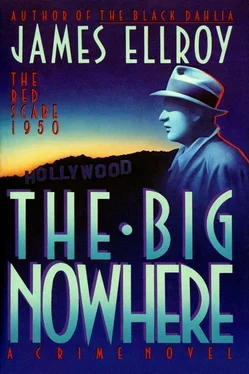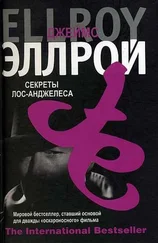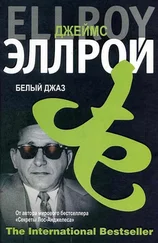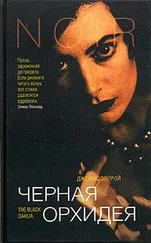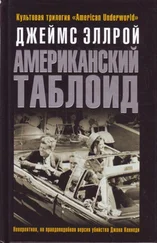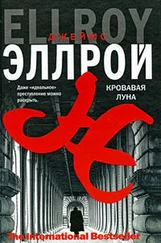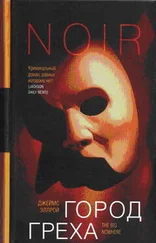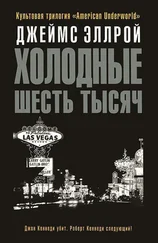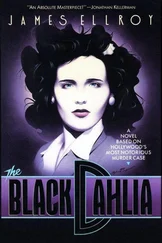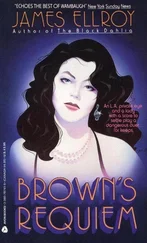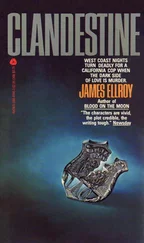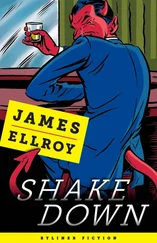After the shootout, and LAPD army got the citizens quelled and the bodies removed. Four dead: Coleman, Loftis, Mal and the back door bouncer he shot. Claire De Haven disappeared — she probably sent Reynolds on his lunatic mission, heard the shots, decided one redemption for the night was sufficient and calmly caught a cab home to plan more People’s Revolts, Beverly Hills style. He followed Mal to the morgue and gave a statement at the Seven-Seven squadroom, tying in the Healy/Loftis deaths to the homo snuffs and insisting the late Deputy Danny Upshaw get credit for cracking the case. His statement glossed the illegalities he and Mal pulled; he didn’t mention Felix Gordean, Chaz Minear, Dudley Smith or Mike Breuning at all. Let fruitfly Chaz live to enjoy his redemption; crazy Dud was too large to tap for the José Diaz kill or Charles Hartshorn’s “suicide.”
Reading between newspaper lines, you could follow the upshot: the Gordean killing unsolved, no suspects; the shootout explained as Mal and himself “following up a lead on an old case”; the dead boogie attributed to Coleman. No Commie or queer homicide angle on it at all — Ellis Loew had beaucoup press connections and hated complications. Reynolds and his son-lover were dismissed as “old enemies settling a grudge” — the howler to top all howlers.
Mal Considine got a hero’s funeral. Mayor Bowron attended, as did the entire LA City Council, Board of Supervisors and selected LAPD brass. Dudley Smith gave a moving eulogy, citing Mal’s “grand crusade” against Communism. The Herald ran a picture of Dudley chucking Mal’s kid Stefan under the chin, exhorting him to “be a trouper.”
Johnny Stomp was his conduit for dope on the grand jury, Ellis Loew to Mickey to him — and it looked like 24-karat stuff on all fronts:
Loew would begin his presentation of evidence next week — perfect timing — the UAES was still bearing the brunt of radio and newspaper editorials blaming them for the Gower Gulch bloodshed. Herman Gerstein, Howard Hughes and two other studio heads had told Loew they would oust UAES the day the grand jury convened — violating the union’s contract on the basis of fine-print clauses pertaining to expulsion for subversive activities.
Johnny’s other glad tidings: Terry Lux had suffered a stroke — the result of “prolonged oxygen deprivation” caused by a mouthful of money and a popped artery in his right hand. He was recuperating well, but ruined tendons in that hand would prevent him from performing plastic surgery again. Mickey Cohen had upped the ante on the Meeks contract to $20,000; Buzz jacked his payoff on the Minear job to $25,000 so Stompanato wouldn’t put a bullet in his head. The Mick was pulling his hair out over Audrey; he’d erected a shrine out of Audrey memorabilia: her stripper publicity pics, the costumes she wore when she headlined the Burbank in ’38. Mickey locked the stuff up in his bedroom at the hideaway and spent hours mooning over it. Sometimes you could hear him crying like a baby.
And Turner Meeks himself, holder of the Va Va Voom Girl’s real true love, was getting fat, fat, fatter on moo shu duck, sweet and sour pork, shrimp chop suey and beef kowloon — a shitload of condemned man’s last meals. And with his money shot a day away, he knew there were two things he wanted to know before he stuck his head in the noose: the whole story on Coleman and why the UAES hadn’t played its extortion scheme against the studios — whatever it was — yet. And he had a hunch he knew where to get the answers.
Buzz went to the motel office, changed a five into nickels and walked to the phone booth in the parking lot. He got out the list of rest homes he’d torn from the Yellow Pages the day of the shootout and started calling, impersonating a police officer. He figured Lesnick would be hiding under an alias, but he hit the flunkies he talked to with his real name anyway, along with “old,” “Jewish,” “dying of lung cancer.” He was $3.10 poorer when a girl said, “That sounds like Mr. Leon Trotsky.” She went on to say that the oldster had checked out against medical advice and left a forwarding address: the Seaspray Motel, 10671 Hibiscus Lane, Redondo Beach.
A cheap Commie joke making it easy for him.
Buzz walked to a U-Drive and rented an old Ford sedan, thinking it looked pretty long in the tooth for a getaway car. He paid a week’s fee in advance, gave the clerk a look at his driver’s license and asked him for a pen and paper. The clerk complied; Buzz wrote:
Dr. Lesnick—
I was in with the grand jury for a while. I was there when Coleman and Reynolds Loftis were killed and I know what happened with them ’42–’44. I didn’t let any of that information out. Check the newspapers if you don’t believe me. I have to leave Los Angeles because of some trouble I’ve gotten into and I would like to talk to you about Coleman. I won’t tell what you tell me to the grand jury — I would get hurt it I did.
T. Meeks.
Buzz drove to the Seaspray Motel, hoping Mal’s death kiboshed the Bureau men looking for Lesnick. It was an auto court at the tail of a dead-end street facing the beach; the office was shaped like a rocket ship pointed at the stars. Buzz walked in and punched the bell.
A youth with godawful pimples came in from the back. “You want a room?”
Buzz said, “Mr. Trotsky still alive?”
“Barely. Why?”
Buzz handed him the note and a five-spot. “Is he in?”
“He’s always in. Here or the beach. Where’s he gonna go? Jitterbugging?”
“Give him the paper, sonny. Keep the five. If he says he’ll talk to me, Abe Lincoln’s got a brother.”
The pimple boy motioned Buzz outside; Buzz stood by his car and watched him walk to the middle of the court and knock on a door. The door opened, the boy went in; a minute later he came out lugging two beach chairs, a stooped old man holding his arm. The hunch played — Lesnick wanted some friendly ears on his way out.
Buzz let them come to him. The old man had a hand extended from ten yards away; his eyes were bright with sickness, his face was muddy beige and everything about him looked caved-in. His voice was strong — and the smile that went with it said he was proud of the fact. “Mr. Meeks?”
Buzz gave the hand a little tug, afraid of breaking bones. “Yessir, Doctor.”
“And what is your rank?”
“I’m not a policeman.”
“Oh? And what were you doing with the grand jury?”
Buzz handed the clerk a fiver and grabbed the beach chairs. The boy walked off smiling; Lesnick held Buzz’s arm. “Why, then? I had thought Ellis Loew’s minions were all policemen.”
Lesnick’s weight on his was almost nothing — a stiff breeze would blow the fucker to Catalina. Buzz said, “I did it for money. You wanta talk on the beach?”
Lesnick pointed to a spot near some rocks — it was free of glass and candy bar wrappers. Buzz shephered him over, the chairs more of a strain than the man. He set the seats down facing each other, close, so he could hear if the Doc’s voice went bum; he settled him in and watched him hunch into folds of terrycloth. Lesnick said, “Do you know how I was convinced to become an informant?”
True snitch behavior — he had to justify himself. Buzz sat down and said, “I’m not sure.”
Lesnick smiled, like he was glad he could tell it. “In 1939 representatives of the Federal government offered me a chance to secure my daughter’s release from Tehachapi Prison, where she was incarcerated for vehicular manslaughter. I was the official CP analyst in Los Angeles then, as I have remained. They told me that if I gave them access to my psychiatric files for evaluation by the 1940 State Attorney General’s probe and other probes that might come up, they would release Andrea immediately. Since Andrea had a minimum of four more years to serve and had told me terrible stories of the abuse the matrons and her fellow inmates inflicted, I did not hesitate one second in agreeing.”
Читать дальше
